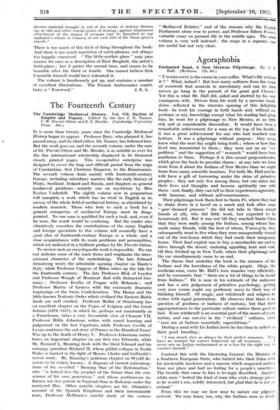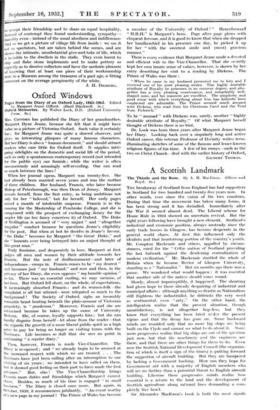Agoraphobia
Enchanted Sand, A New Mexican Pilgrimage. By D. j, Hall. (Methuen. 12s. 6d.) "UNCERTAINTY is the cream in your coffee. What's life without it ? " What, indeed ? But how many sufferers from the strain of 'overwork find amnesia in uncertainty and can let their nerves go hang in the pursuit of the great god Chance? Yet this is what Mr. Hall did, aided and abetted by his very courageous wife. Driven from his work by a nervous break- down—reflected in the staccato opening of this delightful book—he took his courage in both hands and, without ex- perience or any knowledge except what his reading had given him, he went for a pilgrimage to New Mexico, at no little risk and at considerable discomfort. It would have been a remarkable achievement for a man at the top of his health : it was a great achievement for one who had touched rock bottom. It was a pilgrimage without purpose : they never knew what the next day might bring forth ; where or how they lived was immaterial to them ; they were not on an " ex- pedition " and the suggestion of" research" would have been anathema to them. Perhaps it is this casual purposelessness which gives the book its peculiar charm : at any rate we learn more from it about the Indians of New Mexico than we might learn from many scientific treatises. For both Mr. Hall and his wife have a gift of burrowing under the skins of primitive peoples : they not only live among them, but can enter into their lives and thoughts and become spiritually one with them—and, finally, they can tell us their experiences agreeably, with humour, and without self-consciousness.
Their pilgrimage took them first to Santa Fe, where they had to shake down in a hovel on a ranch and look after some " gaw'-damned greasers" (he did not take to these mixed breeds at all), who did little work, but expected to be luxuriously fed. But it was not till they reached Santa Clara that they were really among the Indians, among whom they made many friends, with the best of whom, T'amo-p'in, they subsequently went to live when they were unexpectedly turned out of the rest-house which they had made their temporary home. Their final exploit was to buy a ramshackle ear and to drive through the desert, enduring appalling heat and cold, till they fetched up in New York, where their pilgrimage and the car simultaneously came to an end.
The theme that underlies the book is the niceness of the Indians and the horridness of the white people. Oloja, the medicine-man, cures Mr. Hall's torn muscles very efficiently, and he comments that "there are a lot of things to be learnt from Indians," He is sane in his estimate of the unknown and has a nice judgement of primitive psychology, getting very near (some might say perilously near) to their way of thinking himself. Of magic, and witchcraft and religion he writes with equal penetration. He observes that there is no question of goodness or badness of customs, but that their appropriateness to the particular culture makes them good or bad. Even witchcraft is an essential part of the mores of every nation, and can survive in the " civilized " cultures, since "men are at bottom essentially superstitious."
During a meal with his Indian hosts he has time to reflect on their good breeding :
" I was struck then as always by their perfect manners. They have an instinct for correct behaviour on all occasions. . . . never saw an Indian embarrassed or at a loss for the right way to conduct himself."
Contrast this with the blustering General, the Minister of a Southern European State, who butted into their Eden with his intolerable insolence and a camera which respected neither time nor place and had no feeling for a people's sanctities. The trouble that came to him is lovingly described. Another white man "looked the kind of man who visits strange place:, as he would a zoo, mildly interested, but glad that he is not an animal."
From this we may see how near to nature our pilgrims arrived. We may learn, too, why the Indians were so ready
accept their friendship and to share an equal hospitality. Instead of contempt they found understanding, sympathy— humility even—instead of the usual aloofness and indifference. knd so we .get a picture of village life from inside : we see it not as spectators, but are taken behind the scenes, and are shown the intimate, unsubstantial give-and-take of life, which is invisible to the dwellers in the stalls. They even learnt to chip and flake stone implements and to make pottery so expertly as to deceive collectors and have the sardonic pleasure of knowing that at least one piece of their workmanship rests in a Museum among the treasures of a past age, a fitting comment on the average perspicacity of the white.
J. H. DRIBERG.































 Previous page
Previous page